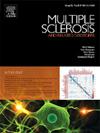儿童发病多发性硬化症疾病改善疗法的疗效和安全性:临床试验和观察性研究的系统综述
IF 2.9
3区 医学
Q2 CLINICAL NEUROLOGY
引用次数: 0
摘要
目的:本研究旨在回顾疾病修饰疗法(DMTs)治疗复发性儿科多发性硬化症(POMS)患者的疗效和安全性。方法:根据系统评价和荟萃分析的首选报告项目(PRISMA)指南进行系统评价。已发表的随机对照试验(RCTs)、对照组非随机研究、大型单臂研究和正在进行的(未发表的)调查已批准和未批准的dmt在POMS中的应用的研究被纳入其中。在MEDLINE(通过PubMed)、EMBASE和Cochrane图书馆中确定了符合条件的已发表研究,在临床试验登记处(www.Clinicaltrials: gov)中确定了未发表的研究。结果:系统评价共纳入13项已发表的研究:4项随机对照试验,3项对照组观察性研究,6项大型单臂研究。在纳入的研究中评估了治疗POMS的以下dmt:干扰素β -1a、干扰素β -1b、特立氟米特、富马酸二甲酯、fingolimod、那他单抗、醋酸格拉替默和奥克雷单抗。MRI显示,所有DMTs在降低POMS患者复发率、预防残疾进展和降低疾病活动性方面均有效。被认为对成人多发性硬化症非常有效的dmt (natalizumab, fingolimod)也被证明比干扰素β -1a对POMS更有效。共纳入9项正在进行(未发表)的研究,包括5项随机对照试验。评估了以下药物:ozanimod、fingolimod、聚乙二醇干扰素β -1a、ocrelizumab、ofatumumab、siponimod、阿仑单抗和natalizumab。结论:经批准用于治疗POMS的dmt数量有限,部分可用dmt超说明书使用。从不同可靠性的已发表研究中获得的证据支持dmt对POMS的疗效。然而,需要在儿科人群中进行精心设计的长期随机对照试验。正在进行的研究结果可能会填补现有临床证据的空白,可能会导致更多高效的dmt被批准用于POMS患者。本文章由计算机程序翻译,如有差异,请以英文原文为准。
Efficacy and safety of disease-modifying therapies in pediatric-onset multiple sclerosis: A systematic review of clinical trials and observational studies
Objective
This study aimed to review the efficacy and safety profile of disease-modifying therapies (DMTs) in patients with relapsing pediatric-onset multiple sclerosis (POMS).
Methods
A systematic review was performed according to the Preferred Reporting Items for Systematic Reviews and Meta-Analyses (PRISMA) guidelines. Published randomized controlled trials (RCTs), nonrandomized studies with a control group, large single-arm studies, and ongoing (unpublished) studies investigating the use of approved and unapproved DMTs in POMS were included. Eligible published studies were identified in MEDLINE (via PubMed), EMBASE, and the Cochrane Library, and unpublished studies were identified in a clinical trials registry (www.clinicaltrials.gov).
Results
A total of 13 published studies were included in the systematic review: 4 RCTs, 3 observational studies with a control group, and 6 large single-arm studies. The following DMTs for the treatment of POMS were evaluated in the included studies: interferon beta-1a, interferon beta-1b, teriflunomide, dimethyl fumarate, fingolimod, natalizumab, glatiramer acetate, and ocrelizumab. All DMTs were shown to be effective in reducing relapse rates, preventing disability progression, and reducing disease activity in MRI in patients with POMS. DMTs that are considered highly effective in adults with multiple sclerosis (natalizumab, fingolimod) were also shown to be more effective than interferon beta-1a in POMS. A total of 9 ongoing (unpublished) studies were identified, including 5 RCTs. The following drugs were evaluated: ozanimod, fingolimod, peginterferon beta-1a, ocrelizumab, ofatumumab, siponimod, alemtuzumab, and natalizumab.
Conclusion
The number of DMTs approved for the treatment of POMS is limited, and some of the available DMTs are used off-label. The available evidence from published studies of varying reliability supports the efficacy of DMTs in POMS. However, well-designed, long-term RCTs in the pediatric population are needed. The results of ongoing studies may fill the existing gap in clinical evidence, possibly leading to the approval of more highly effective DMTs for patients with POMS.
求助全文
通过发布文献求助,成功后即可免费获取论文全文。
去求助
来源期刊

Multiple sclerosis and related disorders
CLINICAL NEUROLOGY-
CiteScore
5.80
自引率
20.00%
发文量
814
审稿时长
66 days
期刊介绍:
Multiple Sclerosis is an area of ever expanding research and escalating publications. Multiple Sclerosis and Related Disorders is a wide ranging international journal supported by key researchers from all neuroscience domains that focus on MS and associated disease of the central nervous system. The primary aim of this new journal is the rapid publication of high quality original research in the field. Important secondary aims will be timely updates and editorials on important scientific and clinical care advances, controversies in the field, and invited opinion articles from current thought leaders on topical issues. One section of the journal will focus on teaching, written to enhance the practice of community and academic neurologists involved in the care of MS patients. Summaries of key articles written for a lay audience will be provided as an on-line resource.
A team of four chief editors is supported by leading section editors who will commission and appraise original and review articles concerning: clinical neurology, neuroimaging, neuropathology, neuroepidemiology, therapeutics, genetics / transcriptomics, experimental models, neuroimmunology, biomarkers, neuropsychology, neurorehabilitation, measurement scales, teaching, neuroethics and lay communication.
 求助内容:
求助内容: 应助结果提醒方式:
应助结果提醒方式:


